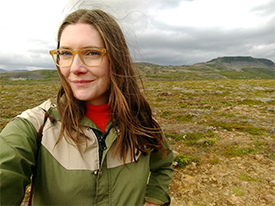Room for Surprises: Emma Skagen
in Conversation with Rami Schandall

Malahat Review book reviewer and volunteer Emma Skagen talks with Rami Schandall, winner of the 2019 Open Season Award for Poetry with her poem, “Timepiece.”
Rami Schandall is a writer, artist, and designer who has lived and practiced in Toronto since the turn of the century. She used to live on the coast — two coasts, in fact. Now far from any sea, she studies lake and sky and cityscape. A great cat in the heart of the city purrs while the poet dreams. She writes amid the ceaseless rumble, poetry, and a novel set in the northern reaches of Vancouver Island. “Timepiece” is her first published work.
Read what contest judge Shane Book had to say about Schandall's winning poem.
As I read and reread “Timepiece,” I found myself wondering if the poem were largely about itself: "Where did the poem go? Did he take it? / Fragile marks made firmer, unpacked — unwritten! / Tossed from greasy bed to bed …” Was this a piece that you found yourself returning to time and time again? Can you tell me a bit about that process? How did you know when the poem was finished?
This poem arrived like a gracious gift. Some poems take weeks or years of rethinking and revision, but this one came quickly and with a strong sense of its own integrity. The writing was an exhilarating, playful process, listening to Barbara Guest and allowing the strangeness and abstraction in her work to lead toward a freedom in my own. I am interested in cognition, following the thread and cadence of thought which might be ignited by the ordinary world, by other writers, other artists — with openness to accident. The poem is a product of juxtapositions and miss-thoughts and distortions that create something new. I delight in the weird turns that come as a surprise. They are so purely odd that I have to accept them as they are. This poem arrived fully packed with such strangeness.
When the poem began to lend itself to a loose, peculiar, and unspecific sense of scene, I knew it was time to stop. I did not want to pin it down. A gesture is there, toward time and place, to meaning, but it is wide open to what the reader brings. That is how I knew it was finished, or finished enough.
As Open Season judge Shane Book commented on your poem, “To read ‘Timepiece’ is to experience both the tumbling feeling of Time's non-linearity and the relentlessness of Time's passage.” What struck me, too, was a feeling of tumbling through not just time, but space, landscape. You have lived on two coasts and are now based in Toronto; how does your relationship with your own setting(s) play in to “Timepiece,” and your writing practice more generally?
Much of my writing is rooted in specific geographies, particularly places I knew in my early life. This poem is very different: the imagery and locations come from another poet’s imagination, filtered through my own. The poem is much more about linguistic playfulness than an attempt to convey something specifically real. The poem has a filmic quality, or perhaps faery tale — cascading images of time and place may resonate with the zeitgeist of real times and places, but they are not part of a personal narrative. My experience of dislocation or relocation could be an unconscious influence, but the phantom places in this poem come from imagination, cultural themes, and artful play.
You mention that “Timepiece” is written in response to the work of Barbara Guest, whose work I have not actually encountered till now. What do you think makes her work unique? In what ways has she been an influence to you?
Barbara Guest is a new discovery for me. I understand that she was particularly connected to nonlinear process, to a kind of linguistic abstract expressionism with a nod to the surreal. I spent many years painting with abstract expressionism as a major influence, and this is perhaps why Barbara Guest’s work has such resonance. I am looking forward to reading more of her work. She employed different techniques to draw inspiration, words, matter, from the world around her, dipping into the ambient soundscape and working with what appeared or arrived. I have been playing with this technique, writing while eavesdropping on overlapping café conversations, listening to poets and to music, looking at photography and art-film and whatever comes into my awareness — allowing for randomness of source, and permitting internal randomness and sharp twists to arise and to remain. I am looking for space in my work — room for surprises, and a sparkling river of insight that is so much broader and more interesting than what my analytic mind generates. It is an ongoing dance between rational, deliberate choice, and a playful, experimental improvisation.
Lastly, can you share a bit about the novel you're working on? And, can we expect to see more poetry from you in the near future?
I do hope more of my poetry will be out into the world soon! I do not have anything to announce at this point but 2019 has been amazing so far. This award is a breakthrough on many levels. As for the book-length project I am working on, it has a long way to go, although it has been brewing for many years already. I can say that the subject matter comes from the true, tragic story of a homesteading family in the Broughton Archipelago, one century ago. I am interested in the telling and miss-telling of that story, what is remembered, what is lost. I am steeping in research, and looking forward to a visit to the primary location this summer. Whether it will be a historical novel or a work of lyrical non-fiction remains to be seen.

Emma Skagen
* * * * * * * *









